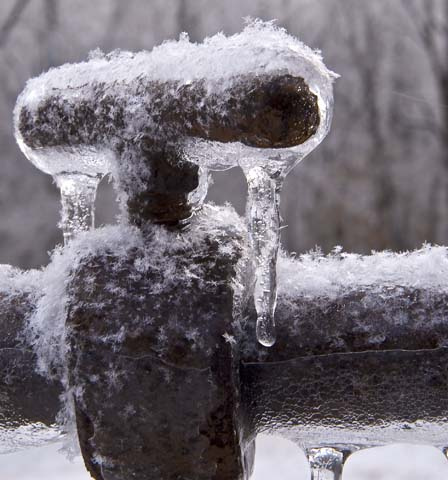Prevent Frozen Plumbing in Cold Weather: Pro Strategies
Prevent Frozen Plumbing in Cold Weather: Pro Strategies
Blog Article
The author is making a number of great points relating to Preventing and dealing with frozen pipes as a whole in the content in the next paragraphs.

Winter can wreak havoc on your pipes, especially by freezing pipelines. Below's exactly how to prevent it from taking place and what to do if it does.
Intro
As temperatures drop, the threat of icy pipes increases, potentially causing costly fixings and water damage. Recognizing exactly how to avoid icy pipelines is crucial for homeowners in chilly environments.
Recognizing Frozen Pipelines
What causes pipelines to freeze?
Pipes ice up when exposed to temperatures listed below 32 ° F (0 ° C) for expanded durations. As water inside the pipes freezes, it increases, putting pressure on the pipe walls and potentially causing them to burst.
Threats and damages
Frozen pipes can result in water disturbances, residential or commercial property damage, and pricey fixings. Ruptured pipes can flood homes and create substantial structural damages.
Indications of Frozen Pipeline
Identifying icy pipes early can stop them from rupturing.
How to determine icy pipes
Seek reduced water flow from taps, uncommon odors or sounds from pipes, and visible frost on revealed pipes.
Avoidance Tips
Insulating susceptible pipelines
Wrap pipes in insulation sleeves or utilize warmth tape to protect them from freezing temperature levels. Concentrate on pipelines in unheated or exterior areas of the home.
Home heating strategies
Maintain interior spaces effectively warmed, especially areas with plumbing. Open cabinet doors to allow cozy air to distribute around pipelines under sinks.
Protecting Outdoor Pipes
Yard pipes and outside taps
Disconnect and drain yard hose pipes prior to winter season. Mount frost-proof spigots or cover exterior faucets with shielded caps.
What to Do If Your Pipes Freeze
Immediate activities to take
If you suspect frozen pipes, maintain faucets available to relieve pressure as the ice melts. Use a hairdryer or towels taken in warm water to thaw pipes slowly.
Long-Term Solutions
Architectural modifications
Take into consideration rerouting pipelines far from outside wall surfaces or unheated areas. Include extra insulation to attic rooms, basements, and crawl spaces.
Updating insulation
Buy top notch insulation for pipes, attics, and wall surfaces. Proper insulation assists keep consistent temperatures and lowers the risk of frozen pipelines.
Verdict
Preventing frozen pipes needs aggressive actions and quick responses. By comprehending the causes, indications, and preventive measures, house owners can shield their pipes throughout winter.
Helpful Tips to Prevent Frozen Pipes this Winter
UNDERSTANDING THE BASICS: WHY PIPES FREEZE AND WHY IT’S A PROBLEM
Water freezing inside pipes is common during the winter months, but understanding why pipes freeze, and the potential problems it can cause is crucial in preventing such incidents. This section will delve into the basics of why pipes freeze and the associated problems that may arise.
THE SCIENCE BEHIND FROZEN PIPES
When water reaches freezing temperatures, it undergoes a physical transformation and solidifies into ice. This expansion of water as it freezes is the primary reason pipes can burst. As the water inside the pipe freezes, it expands, creating immense pressure on the walls. If the pressure becomes too great, the pipe can crack or rupture, leading to leaks and water damage.
FACTORS THAT CONTRIBUTE TO PIPE FREEZING
Low Temperatures: Extremely cold weather, especially below freezing, increases the risk of pipes freezing. Uninsulated or Poorly Insulated Pipes: Pipes located in unheated areas, such as basements, crawl spaces, or attics, are more prone to freezing. Insufficient insulation or lack of insulation altogether exacerbates the problem. Exterior Wall Exposure: Pipes running along exterior walls are susceptible to freezing as they encounter colder temperatures outside. Lack of Heating or Temperature Regulation: Inadequate heating or inconsistent temperature control in your home can contribute to frozen pipes. PROBLEMS CAUSED BY FROZEN PIPES
- Pipe Bursting: As mentioned earlier, the expansion of water as it freezes can cause pipes to burst, resulting in significant water damage.
- Water Damage: When pipes burst, it can lead to flooding and water damage to your property, including walls, ceilings, flooring, and personal belongings.
- Structural Damage: Prolonged exposure to water from burst pipes can compromise the structural integrity of your home, leading to costly repairs.
- Mold and Mildew Growth: Excess moisture from water damage can create a favorable environment for mold and mildew growth, posing health risks to occupants.
- Disrupted Water Supply: Frozen pipes can also result in a complete or partial loss of water supply until the issue is resolved.
WHY CERTAIN PIPES ARE MORE PRONE TO FREEZING
- Location: Pipes located in unheated or poorly insulated areas, such as basements, crawl spaces, attics, or exterior walls, are at higher risk of freezing.
- Exterior Pipes: Outdoor pipes, such as those used for irrigation or exposed plumbing, are particularly vulnerable to freezing as they are directly exposed to the elements.
- Supply Lines: Pipes that carry water from the main water supply into your home, including the main water line, are critical to protect as freezing in these lines can affect your entire plumbing system.
- Underground Pipes: Pipes buried underground, such as those connected to sprinkler systems or outdoor faucets, can be susceptible to freezing if not properly insulated.
https://busybusy.com/blog/helpful-tips-to-prevent-frozen-pipes-this-winter/

Do you enjoy reading up on How to Prevent Your Pipes From Freezing? Post a short review below. We will be happy to listen to your thoughts about this article. We hope that you come back again later on. Appreciated our posting? Please quickly share it. Help others check it out. Thank you so much for taking the time to read it.
Book 24/7 Report this page